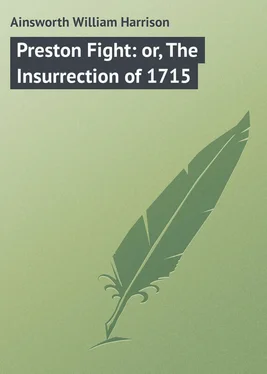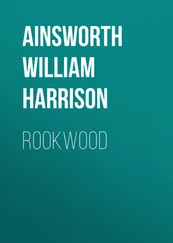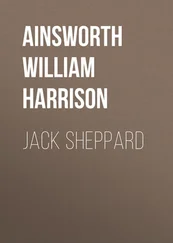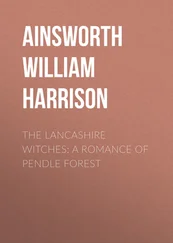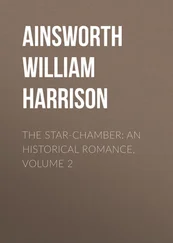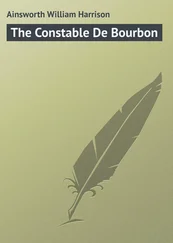William Ainsworth - Preston Fight - or, The Insurrection of 1715
Здесь есть возможность читать онлайн «William Ainsworth - Preston Fight - or, The Insurrection of 1715» — ознакомительный отрывок электронной книги совершенно бесплатно, а после прочтения отрывка купить полную версию. В некоторых случаях можно слушать аудио, скачать через торрент в формате fb2 и присутствует краткое содержание. ISBN: , Жанр: foreign_prose, на английском языке. Описание произведения, (предисловие) а так же отзывы посетителей доступны на портале библиотеки ЛибКат.
- Название:Preston Fight: or, The Insurrection of 1715
- Автор:
- Жанр:
- Год:неизвестен
- ISBN:http://www.gutenberg.org/ebooks/49851
- Рейтинг книги:4 / 5. Голосов: 1
-
Избранное:Добавить в избранное
- Отзывы:
-
Ваша оценка:
- 80
- 1
- 2
- 3
- 4
- 5
Preston Fight: or, The Insurrection of 1715: краткое содержание, описание и аннотация
Предлагаем к чтению аннотацию, описание, краткое содержание или предисловие (зависит от того, что написал сам автор книги «Preston Fight: or, The Insurrection of 1715»). Если вы не нашли необходимую информацию о книге — напишите в комментариях, мы постараемся отыскать её.
Preston Fight: or, The Insurrection of 1715 — читать онлайн ознакомительный отрывок
Ниже представлен текст книги, разбитый по страницам. Система сохранения места последней прочитанной страницы, позволяет с удобством читать онлайн бесплатно книгу «Preston Fight: or, The Insurrection of 1715», без необходимости каждый раз заново искать на чём Вы остановились. Поставьте закладку, и сможете в любой момент перейти на страницу, на которой закончили чтение.
Интервал:
Закладка:
“Such is my own opinion,” remarked Lord Derwentwater.
“There are a hundred hiding places in the old castle,” pursued Lord Widdrington; “and besides, a boat can be always in readiness, so that your majesty could be taken to Lindisfarne, where you might be concealed for a month.
“Whatever course you advise, my lord, I will adopt,” said the prince. “But I must not be deprived of the power of retreat.”
“‘Tis therein especially that Bamborough has the advantage over this mansion, my liege,” said Forster, who had come up. “I will answer with my life that you shall not fall into the hands of your enemies.”
“And I dare not assert as much, since I might not be able to make good my words,” said Lord Widdrington.
“That decides me,” cried the prince. “I shall take up my quarters at Bamborough.”
“I trust your majesty will tarry awhile, and accept such hospitality as I am able to offer you,” entreated Lord Widdrington.
“How say you, my lord?” cried the prince, appealing to Lord Derwentwater. “Shall I stay? I am in your hands.”
His lordship thought an hour’s halt might be risked, so the whole of the party dismounted, and were conducted to a large antique dining-hall, adorned with portraits of the family, commencing with Gerard de Widdrington, who flourished in the time of Edward the Third.
Here a goodly repast was served with remarkable promptitude. Of course, the viands were cold, but those who partook of them were too hungry to care for that – for they had breakfasted but slightly before starting, – and even the two fair damsels had gained a good appetite by the ride.
Claret there was in abundance, and a goblet was devoted to a young pair of whose recent betrothal Lord Widdrington had just heard. The health of King James was drunk at the close of the repast, which was not prolonged beyond an hour. At the expiration of that time the horses were brought round.
After glancing round the entrance-hall, which was panelled with oak, and decked with trophies of the chase and ancient weapons, and admiring the carved oak staircase, the prince went forth, and mounted his steed – Lord Widdrington holding the bridle. With graceful gallantry, his lordship next assisted the two fair equestrians to the saddle. This done, he mounted his own horse, with the purpose of attending the prince to Bamborough. Moreover, he had ordered half a dozen well-armed men to follow at the rear of the troop.
With this additional force the party proceeded on its way – though not at the same rapid pace as heretofore.
IV. – DUNSTANBOROUGH CASTLE
No longer feeling any uneasiness, the prince greatly enjoyed the ride along this remarkable coast, which, besides being studded with ancient castles, commands unequalled sea-views.
The day was fine, with a fresh breeze blowing from the North Sea. Many vessels were in sight, giving life to the picture.
Before them lay Warkworth Castle, finely situated on a peninsula, at the mouth of the lovely river Coquet, and the sight of the tall grey towers of this imposing structure so full of historical recollections, greatly moved the prince.
“From that proud castle of the Percys I should like to be proclaimed,” he cried aloud.
“Your wish shall be gratified, my liege, that we promise you,” rejoined Lord Widdrington and Mr. Forster, who overheard the exclamation.
And they fulfilled their promise, but not till a later date.
An ancient stone bridge across the Coquet brought the prince in front of the castle, and he paused for a few minutes to gaze at it. Fain would he have visited the Hermitage, but the wish could not be gratified, and he rode on through the little town. No interference was offered to the party since Lord Widdrington and Mr. Forster were at its head.
To Warkworth quickly succeeded a still finer castle – Alnwick; and the prince was again lost in admiration of the second magnificent feudal structure reared on a height above the town, and lording it over the surrounding country.
Guessing his highness’s thoughts, Lord Widdrington said:
“Had your majesty these two castles, with Dunstan-borough and Bamborough, and all four well garrisoned, you might hold your own till an army could be raised, that should win you your kingdom.”
“Bamborough is yours already, my liege,” added Forster. “And doubt not the others will be gained.”
Several fresh objects interested the prince as he rode on. Amongst them was Howick Tower, now destroyed.
Soon afterwards Dunstanborough Castle could be descried on the right. As the prince advanced, it was easy to perceive that the enormous pile was in ruins, but it still looked strong, and its position on a ridge of rocks overlooking the sea was strikingly grand.
Several towers and a large portion of the walls were left; but that the castle could be rendered capable of defence seemed very doubtful to the prince, though both Lord Widdrington and Mr. Forster were of a different opinion.
“If your majesty had time to inspect the stronghold, I would convince you of its importance,” said Lord Widdrington. “Ruined as it is, it is so immensely strong that I would undertake to hold it for a month, and with a few large guns it would command the sea.”
“There are some extraordinary caverns beneath the castle, where any amount of arms and ammunition sent from France could be stored,” observed Forster.
“Obtain possession of the place as soon as you can,” remarked the prince. “It ought to belong to us.”
“It shall belong to your majesty,” said Lord Widdrington.
During the ride along the coast, Lord Derwentwater had not deemed it necessary to pay especial attention to the prince, since Lord Widdrington was better able than himself to furnish any information his highness might require.
The enamoured earl, therefore, felt at liberty to devote himself exclusively to the object of his affections. To enjoy greater freedom, the young pair separated themselves from the troop, and pursued their course along the turf that skirted the road – halting, occasionally, to gaze at the sea.
Attracted by Dunstanborough Castle, they galloped towards the grand old ruin, and after a brief survey of the gateway and towers were hastening back across the plain, when Anna’s horse stumbled and fell. Before the earl could dismount and come to her assistance, she had regained her feet, but her horse had sprained his shoulder so badly that he could scarcely move.
Deeming it the best thing that could be done, Lord Derwentwater proposed to ride as quickly as he could after the party, and bring back another horse for her.
“Dare you remain here alone till I return?” he said.
“I am not in the slightest degree afraid,” she replied.
“I shall not be away many minutes,” he cried, dashing off at full speed.
By this time, the party had disappeared, but he soon overtook them, and in less than five minutes returned with one of Lord Widdrington’s grooms.
But Anna was not there. The poor disabled horse had never stirred from the spot. But its mistress was gone.
Lord Derwentwater gazed anxiously in every direction, but could see nothing of her. Thinking she might have gone to the castle, he hurried thither, followed by the groom, dashed through the gateway, and through an inner gate into the court.
Here he gazed distractedly around, but could see no one. Nor was any answer returned to his cries.
V. – HOW THE PRINCE WAS LODGED IN THE OLD FORTRESS
Meanwhile, the prince and his attendants had proceeded tranquilly on their way to Bamborough Castle, which is not more than an hour’s ride from Dunstanborough.
But nearly double that time was consumed on the present occasion, for the prince made several halts, being greatly struck by the imposing aspect and commanding position of the old stronghold.
Читать дальшеИнтервал:
Закладка:
Похожие книги на «Preston Fight: or, The Insurrection of 1715»
Представляем Вашему вниманию похожие книги на «Preston Fight: or, The Insurrection of 1715» списком для выбора. Мы отобрали схожую по названию и смыслу литературу в надежде предоставить читателям больше вариантов отыскать новые, интересные, ещё непрочитанные произведения.
Обсуждение, отзывы о книге «Preston Fight: or, The Insurrection of 1715» и просто собственные мнения читателей. Оставьте ваши комментарии, напишите, что Вы думаете о произведении, его смысле или главных героях. Укажите что конкретно понравилось, а что нет, и почему Вы так считаете.
